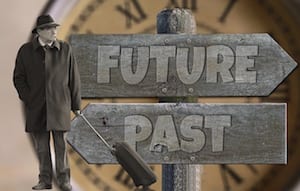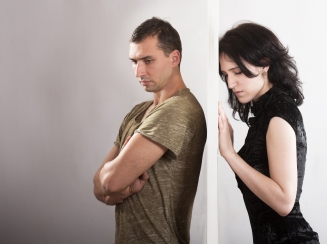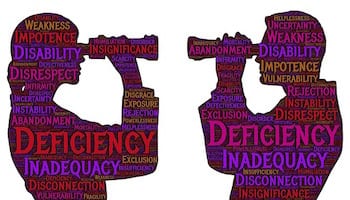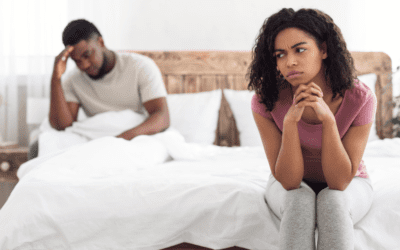Fear Of Being Alone Creates Distance In Relationships
 We all believe that being in love is going to bring us overwhelming feelings of happiness and joy.
We all believe that being in love is going to bring us overwhelming feelings of happiness and joy.
So we get into relationships with high hopes.
But along with the high hopes, we also bring our baggage from past relationships and our childhood.
You long for a partner who loves you unconditionally, supports you in all your hopes and dreams, listens when you feel lost and vulnerable and who offers a safe haven through the ups and downs of life.
A person who is both your best friend and a passionate lover.
Baggage From Our Past
 It is often the baggage that you dragged into the relationship, not how the other person acts or behaves, that prevents you from getting what you want.
It is often the baggage that you dragged into the relationship, not how the other person acts or behaves, that prevents you from getting what you want.
The closeness and love you start to experience inevitably brings your issues up to the surface.
Here are just some examples of common issues you may bring to the relationship:
• Feeling unlovable
• Intolerance to criticism
• Unexplained moodiness and depression • Explosive rage
• Needing to be cared for
Crazy Paradox
You would think those issues occur, because of the lack of love in your relationship.
Although these issues typically start in childhood, when you did not get the attention and love from your caregivers you needed as a child….
It is actually the experience of being loved in your present life as an adult, that brings the problems to the surface.
Sounds crazy, right?!
Your partner’s love does the capability to heal you, but the healing process first brings the problems up.
Problems Emerge
 When you start encountering problems in the relationship, you don’t understand where they come from or how to deal with them.
When you start encountering problems in the relationship, you don’t understand where they come from or how to deal with them.
All you know is that your partner suddenly acts distant or inconsiderate or you feel an undercurrent of anger and disgust with them.
You had no idea they were simply a indicator of a far deeper cause.
Because our knee jerk reaction is to reacting to their behavior or how you feel, you do what you think makes sense: retreat or blame the problems on your partner.
Typical Scenario
Let’s say that the deeper cause of your problems are that you do not think you are worthy of positive attention and love, because of what happened to you in the past.
So you will unconsciously feel very uncomfortable when you get some positive attention and love.
For instance have you ever had someone tell you or act in a way that showed you, they think you’re awesome or lovable?
What happened in your mind and body when you heard or observed this sentiment?
Disagree with them?
Change the subject?
Turn away?
Dismiss them?
Your partner, in turn, probably thought you were being moody or withdrawn, which is the symptom.
But the underlying cause or real reason is that you don’t feel worthy of positive attention and love and that was created many years ago when your parents rejected you in some way.
Blocking Love
Here’s an astonishing fact: Most of us have some resistance to receiving positive loving energy.
 That means that every one would benefit from learning about the reasons why you may be blocking it.
That means that every one would benefit from learning about the reasons why you may be blocking it.
It is the awareness of why you are acting out, being triggered or feeling rejected that is at the heart of transforming a troubled relationship to a strong, loving, bonded relationship.
It is only after you understand the underlying reasons you are blocking the love you so desperately want that you can find creative ways to solve the issues.
Then you will feel safe to communicate more openly and truthfully with your partner.
Close Relationships Bring Out The Best/Worst
Close relationships bring out the absolute best and the absolute worst in us.
The reason for this paradox is that a close relationship challenges the two major fears that all human beings carry with them: the fear of getting close and the fear of being alone.
Ideally, you would have the ability to feel comfortable being close to other people and independent.
The truth is, few of us are completely at ease with both without some significant understanding and introspection.
Reconciling The Fear of Being Close and Being Alone
One of the common symptoms of a fear of being close is when you or your partner withdraws from the relationship when things start to feel a bit “heavy.”
 For example, you’ve been dating someone for a few months and decide to go away on a romantic weekend. You share your feelings and talk about your hopes and dreams for the future.
For example, you’ve been dating someone for a few months and decide to go away on a romantic weekend. You share your feelings and talk about your hopes and dreams for the future.
But once you get home, either you or your partner pulls away.
If it’s your partner who withdraws, you question what happened and wonder why are they suddenly acting so distant?
If you’re the one who withdraws, you suddenly find yourself needing some “space” or feeling smothered by your partner, who now seems to want much more time and attention than you’re willing to give.
You think…
Didn’t I just spend several days with this person?
So why are they texting me so much and wanting to see me again so soon?
Upper Limits
 This is how it plays out when there’s an underlying fear of getting too close, losing your autonomy, but at the same time, fearing being alone.
This is how it plays out when there’s an underlying fear of getting too close, losing your autonomy, but at the same time, fearing being alone.
It is what Gay Hendricks calls an “upper limits” problem in his book, The Big Leap.
When you are feeling too happy or close, you will find a reason to distance yourself, to keep yourself safe.
You can though learn how to balance both togetherness and independence, so that the arguments, tension and withdrawal that have been an issue in the past can be resolved quickly.
If you are interested in learning how to resolve your “upper limits” problem and practical, step-by-step ways to handle everyday conflicts that arise, click here.





0 Comments